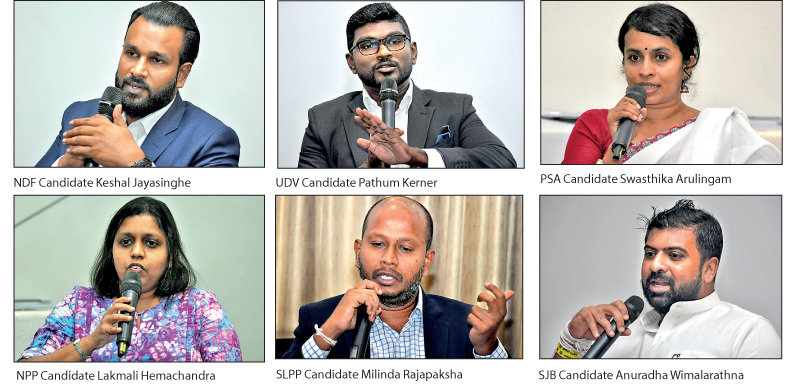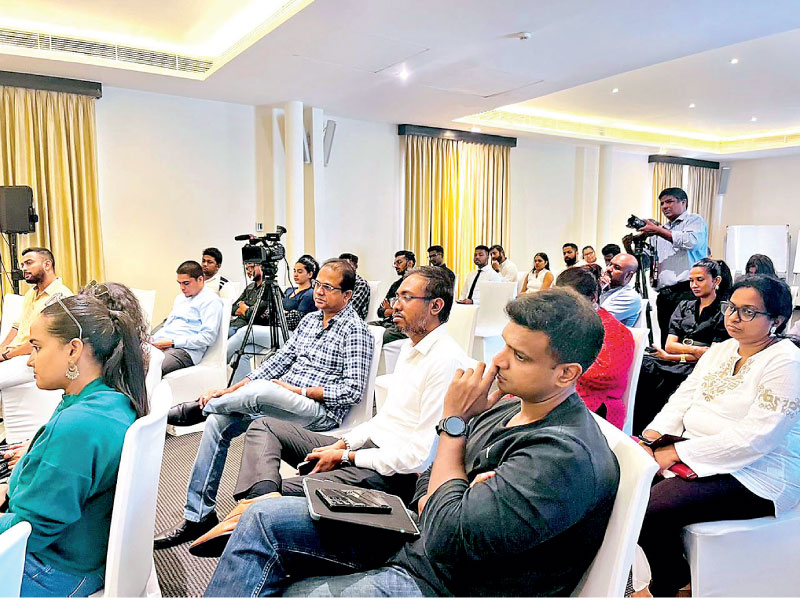

The Coalition for Inclusive Impact (CII) successfully hosted a Cross-Party Youth Dialogue at the Galle Face Hotel, Colombo on 10 November.
It brought together young representatives from across the political spectrum to discuss critical issues shaping Sri Lanka’s future. Through the CII’s non-partisan, independent platform, attendees engaged in open and impactful dialogue on the country’s challenges and opportunities.
The panel included Keshal Jayasinghe (National Democratic Front), Pathum Kerner (United Democratic Voice), Swasthika Arulingam (People’s Socialist Alliance), Lakmali Hemachandra (National People’s Power), Milinda Rajapaksha (Sri Lanka Podujana Peramuna), and Anuradha Wimalarathna (Samagi Jana Balawegaya). Each panellist brought unique perspectives, highlighting their parties’ stances on important national issues.
The dialogue centred around several pressing topics that resonate deeply with Sri Lankan citizens:
- Education reform: Keshal Jayasinghe emphasised that education reform is not just a Colombo-centric issue, but a broader challenge faced by the entire country. He stressed the need for a very public discourse on education reform to address the needs of students across all regions.
- Learning from past governance: The conversation included reflections on lessons learned from previous Government administrations, emphasising the need to correct past missteps and establish a foundation for more stable and transparent governance. Pathum Kerner noted: “We are entering into a different era of politics now; we have broken the whole system down and now we have to create a new one.”
- Race and equity: The panel explored topics of racial harmony and social equity, underscoring the importance of promoting an inclusive society that values diversity and provides equitable opportunities for all communities. Anuradha Wimalarathna said: “There are countries that give priority to their main religion, and there is nothing wrong with that as long as everyone else gets to practise their religion as well.”
- Gender equality: Gender equality was recognised as an essential factor in building a progressive society. Panellists discussed strategies for empowering women and ensuring equal representation and rights across the nation.
- Public transportation: Participants addressed the need for improved public transportation systems as a means to reduce congestion, support environmental sustainability, and enhance accessibility for all Sri Lankans. Panellists debated whether the Government should be responsible for this or if privatisation would improve efficiency. Differing ideologies were presented, with some candidates suggesting Public-Private Partnerships (PPP) as a potential solution.
- Affordable housing: Another key topic of discussion was improving and providing affordable housing for the poor in Colombo. Panellists explored potential solutions for alleviating the housing crisis in the capital.
- Social cohesion: The topic of social cohesion was one of the most contentious, with candidates taking different stances on accountability for the genocide committed during the civil war. While some emphasised the need for accountability, others suggested that Sri Lanka should focus on moving forward.
- The 13th Amendment: The discussion also touched on the 13th Amendment and the differing views on devolving power to the provinces. The SJB candidate argued that Sri Lanka is too small to have provincial councils and proposed transferring powers to local councils and parliaments, effectively eliminating the provincial system. In contrast, others argued that devolving powers would foster economic development and address land rights issues.
- Rural development: Lakmali Hemachandra highlighted that for rural development, the local Government must be strengthened, and that this should be an important area of focus going forward. “We will take that into consideration.”
- Corruption and other issues: The dialogue also addressed corruption, the LGBTQ Act, women’s and youth empowerment, and the broader need for public inclusion in the political process. Milinda Rajapaksha emphasised that: “After 14 [November], we all have to work towards protecting the bigger democratic idea of this country.”
Everyone appreciated the platform created by the CII, recognising the importance of encouraging youth engagement in politics and giving young leaders the opportunity to voice their opinions on critical national issues.
The success of this dialogue marks another milestone in the CII’s commitment to fostering a more inclusive Sri Lanka. As part of a series of cross-party events held across districts, including Matara, Kurunegala, Kandy, Monaragala, and Nuwara Eliya, the CII aims to continue creating spaces for meaningful dialogue that bring together young leaders and community members.
With more cross-party dialogues planned across the country, the CII said it seeks to drive change by empowering youth, women, and marginalised voices to engage actively in politics. Supported by international development partners, the CII’s vision is to create an inclusive Sri Lanka that champions transparency, collaboration, and civic engagement.
-Pix by Lasantha Kumara

